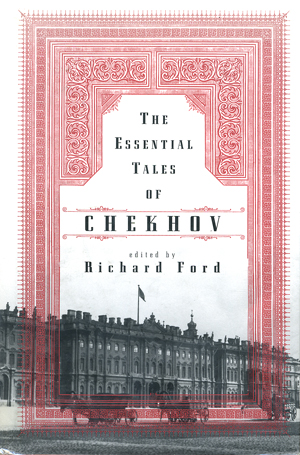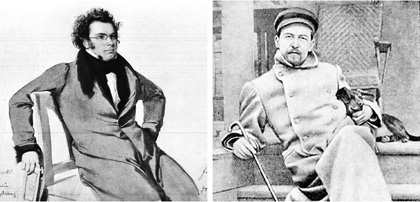
|
|
Vol. LXII, No. 6
|
|
Wednesday, February 6, 2008
|

|
|
Vol. LXII, No. 6
|
|
Wednesday, February 6, 2008
|

|

|
Yesterday, January 29, was Chekhov’s birthday. Tomorrow is Schubert’s. Never mind the formalities, full names, death dates, and such, Chekhov and Schubert are with us, like tea and coffee, sunrise and sunset, and they make a nice pair of bookends for a January 30 column. Since this is billed as a book review, however, and since I celebrated Schubert last year on his birthday, my focus will be on Chekhov.
In his introduction to The Essential Tales of Chekhov (Ecco 1998), which is available at the Princeton Public Library, Richard Ford confesses that until he began his “long and happy passage” through all the stories on his way to deciding which ones to include, he’d read very little of Chekhov. His experience had been “abrupt and brief” and had come “too early.” So did mine, in spite of the fact that my passion for Russian literature in college was such that I ended up with a minor in Slavic Studies. Ford puts it well when he says that Chekhov seems to him to be “a writer for adults, his work becoming useful and also beautiful by attracting attention to mature feeling.”
Neither Chekhov nor Schubert “spoke to me” until I became a father in my late thirties. When you’re young, you’re more susceptible to the grandiose creations of the Beethovens and Dostoevskys. With Schubert it’s not the Unfinished Symphony or the Great C-Major Symphony but some deceptively simple, hair-raisingly beautiful theme in the adagio movement of one of the late piano sonatas, or, most memorably for me, the chorus for female voices (Standchen) that was playing gently, almost inaudibly, in the background very late one night when I first “heard” Schubert.
Reading at Random
Not long ago, around the same hour, I picked up a volume of Chekhov from a row in uniform bindings lining a shelf in the living room. Sometimes it’s more interesting to choose a story at random rather than following some prescribed or recommended course. If you believe 200-plus stories (not to mention the plays) represent a world, then this approach to Chekhov is a bit like arriving by train at some nameless town in the dead of night without a guidebook or an inventory.
On the occasion in question I found a slice of Russian life perfectly suited to the mood of the hour, “a little touch of Chekhov in the night.” The story is called “Anya” and as I stand there reading by the light of a small lamp, the only light in the house, I suddenly find myself in a chilly little room on the other side of the world watching from the shadows as a medical student paces around studying for his exams while a thin, pale young woman of 25 with mild grey eyes is sitting on a stool “embroidering with red thread the collar of a man’s shirt.” The room’s a study in disorder, crumpled bedclothes, pillows thrown about, dirty dishes, books everywhere, and the whole mess seems to revolve around a slop pail filled with soap suds in which cigarette butts are floating. Finding he needs a “living body” to help him study the relation of the rib cage to the lungs, the student uses Anya, counting her ribs and even drawing some lines on her chest with a crayon, so he can make comparisons and “sound” her, which he does while she’s shivering in the cold, having removed her blouse: “H’m! … One can’t feel the first rib; it’s behind the shoulder-blade. … This must be the second rib. … Yes … this is the third … this is the fourth. … H’m! … yes. … Why are you wriggling?” To this the living body replies, “Your fingers are cold!”
Chekhov never gets in the way of the moment, and only a critic with a mission would want to encumber it with terms like “realism” or “naturalism.” Several pointed references to the slop pail have you comprehending the room not as a sociological statement but as the student sees it after loaning Anya to an artist friend, who wants her to model for him. Because the artist made disparaging comments about the unkempt room, the student finds himself focusing on the clean, comfortable future he’s sure will be his once he has a practice. He will move on to a better life, but not with Anya, who will be left behind with such things as the slop pail. When she returns, exhausted, having modeled for the artist and his paint brush much as she submitted herself to the student’s crayon, she’s told that she must leave; it’s the student’s first movement toward that better life. This isn’t the first time Anya’s been sent packing. At least four other young students and artists have used her and disposed of her. She’s crying as she puts her few possessions together; she tries to hide her tears, and though you hurt for her, Chekhov hasn’t played on your sympathies. He’s simply shown you the moment, and when the student changes his mind and lets her stay, it isn’t so much from compassion as need: besides being an exam crutch, it’s up to her to see that he has tobacco and tea and sugar and that his shirts are in good repair. And you know who will empty the slop pail and tidy the place up well enough to discourage the master from dreaming of that clean, comfortable future. At the end of the story you hear someone in the hall outside shouting “Where’s the samovar?” and your visit ends as randomly as it began, and if you’re me, you walk into the kitchen to make yourself a cup of tea.
Common Ground
So simple it seems, and so rare, Chekhov’s art. His tact, integrity, and restraint, together with his abiding humanity, establish a special element you simply believe in, as you do when Schubert sets the scene of one of his 600-plus songs so that you don’t need to understand German or even music to feel yourself in the presence of the composer, he at the piano, his friend Vogl singing, a cup of coffee near at hand. It’s the common ground of ordinary life, the basics, the random essentials that accompany and nourish the making of literature and music. It’s the sort of detail that lives on in Schubert’s letters, which I just now opened at random and found this abrupt mid-sentence aside in a letter to his brother: “My foot has gone to sleep and that is very annoying. If the silly thing could write, it wouldn’t fall asleep.”